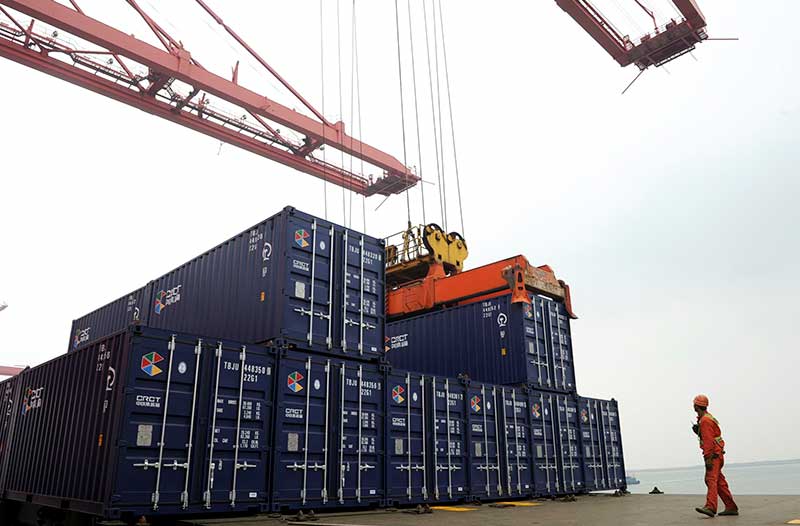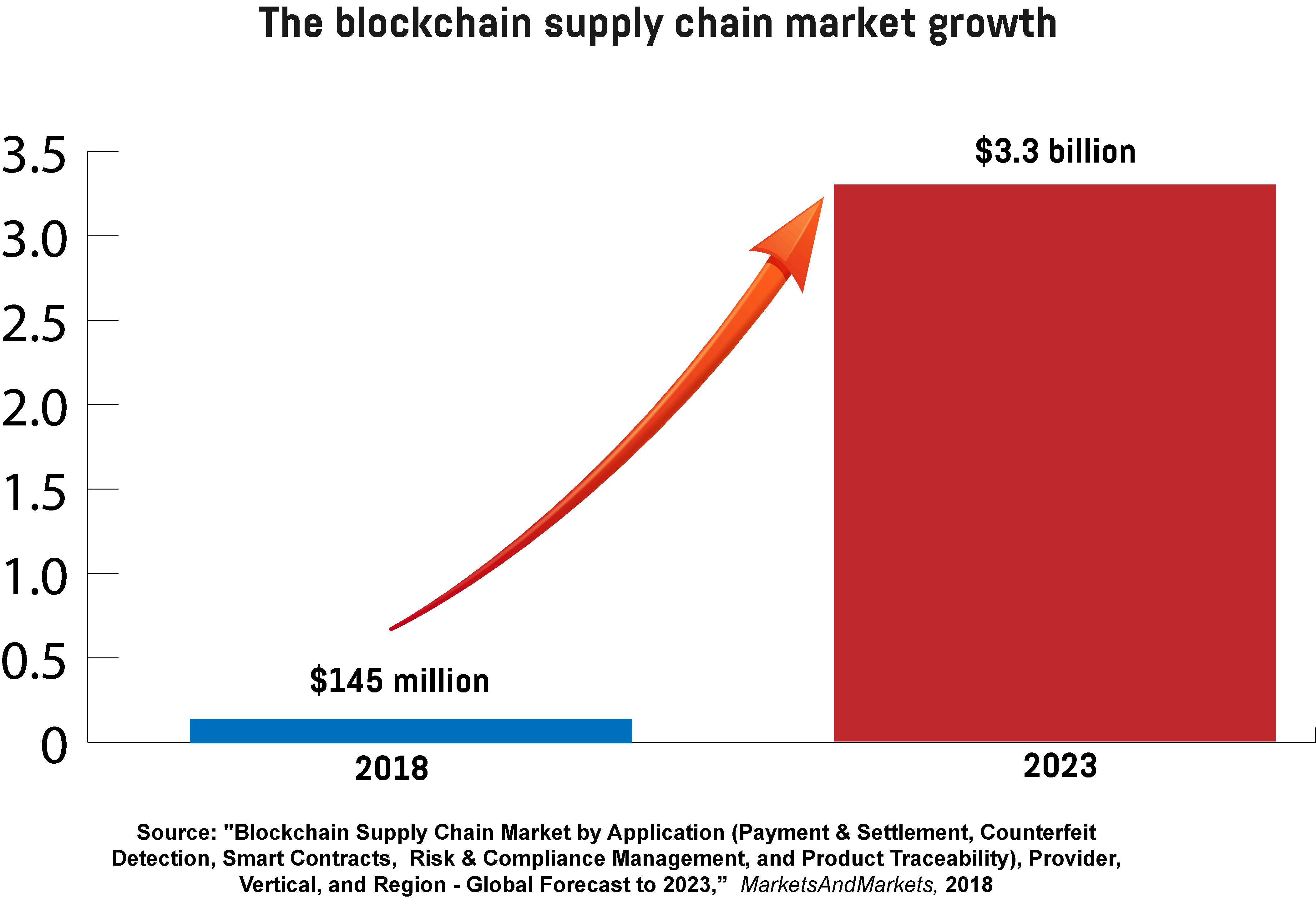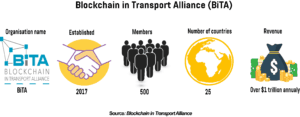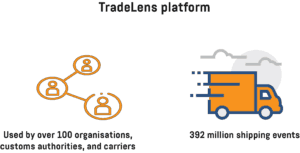- The benefits of blockchain in the logistics space
- BiTA focuses on creating and promoting the adoption of blockchain standards in the logistics industry
- SkyCell created blockchain-enabled refrigerated containers
- TradeLens is a blockchain-based shipping solution designed to promote more efficient and secure global trade
- Blockchain ensures transparency and authenticity in the supply chain
- The future of blockchain in logistics
The world’s supply chain is becoming bigger and more complex, but companies often lack the right tools to cope with such massive growth. As a result, operational inefficiencies, fraud, and waste are becoming common issues. They affect not only supply chain stakeholders, but also our society in general. And due to costs imposed by intermediaries, food producers such as small-scale farmers often don’t get the right price for their produce, which directly impacts their profit. Consumers are also affected, because when those products finally reach retail shelves, they don’t know their origin and route. So, is there a way to make the logistics industry less chaotic? The answer is yes. Blockchain, the technology behind Bitcoin, has already proved to be beneficial in the finance sector, and it could do the same for logistics.
The benefits of blockchain in the logistics space
The reason why blockchain is so well-suited for use in the supply chain lies in the fact that this technology provides a great level of transparency, and that’s something the industry desperately needs. Blockchain allows participants to exchange data in a trusted manner. According to a survey conducted by the German logistics provider Hermes, over one third of logistics professionals believe that blockchain can improve collaboration among suppliers and customers. Since all transactions are stored in one place, and the information can’t be erased, all stakeholders, from shippers and freight brokers to insurance providers and customers, can find out everything they need to know about a specific product. By accessing the information stored on blockchain, they can see whether the product has been properly maintained, which is particularly useful in food shipments.

One of the most exciting applications of blockchain technology are probably smart contracts. Smart contracts are “automatically executable lines of code that are stored on a blockchain”. While most businesses still rely on paper-based contracts, smart contracts are digital, and they’re designed to automate payments. The concept is quite simple: only after the terms created by two or more parties are met, the payment will be processed. For instance, when a carrier delivers a shipment to a specific warehouse, the smart contract will execute itself to finalise the payment. This makes the system conflict-free and eliminates the need for a middleman.
BiTA focuses on creating and promoting the adoption of blockchain standards in the logistics industry
With so many benefits, blockchain seems to be the holy grail of the logistics industry, which is why more companies are eager to adopt it. And interest in this tech will undoubtedly accelerate its market growth in the future. As MarketsandMarkets reveals, the blockchain supply chain market is expected to grow from $145 million in 2018 to $3.3 billion by 2023.

To increase their market share, many companies are joining the Blockchain In Transport Alliance (BiTA). Though it was established only two years ago, this organisation is the biggest commercial blockchain alliance today. It has 500 members from 25 countries, which generate over $1 trillion worth of revenue per year. Some of its members include well-known freight companies from the logistics and transportation industry such as UPS and FedEx. All of BiTA’s members share the same goal: to accelerate the adoption of blockchain tech in logistics.

To make this happen, alliance members are focused on the development of industry standards and on educating others about blockchain applications. One of the newest members of BiTA is the Canada-based company LiteLink Technologies, which is currently working on an end-to-end logistics management platform that uses the power of blockchain and artificial intelligence to “bring cost efficiencies to the table” and remove disputes from the industry. Chris Burruss, the president of BiTA, says that LiteLink’s “expertise in blockchain applications will help BiTA develop and deploy blockchain standards”.
SkyCell created blockchain-enabled refrigerated containers
Another company determined to make the logistics industry more efficient is a Swiss firm called SkyCell. The company specialises in the development of temperature-controlled containers for the air freight industry. But these aren’t some ordinary containers. They’re traced with blockchain to secure sensitive goods such as biopharmaceutical drugs. Biopharmaceuticals are labour-intensive and tedious to make, which makes the production process more expensive compared to the production of traditional drugs. These drugs are highly sensitive to changes in temperature, and even a minor change can make the product inefficient, or in some cases, dangerous to human health.
Also, if these products get compromised, drug manufacturers can experience huge financial losses. “This is typical of a pharma supply chain—super-expensive, mission-critical bulk shipments—where if you lose a shipment you lose weeks of inventory,” says SkyCell’s co-founder and CEO, Richard Ettl. To minimise waste and improve operations in the shipment system, SkyCell created a sensor-equipped container that monitors geolocation, humidity, and temperature. Since it’s connected to a blockchain-based cloud platform, all data related to each container, including customs forms and lading information, is stored on the system, so manufacturers and suppliers can easily trace a specific container and access its information in real time. With better product management, pharma companies can reduce waste and save money.
TradeLens is a blockchain-based shipping solution designed to promote more efficient and secure global trade
Saving money was also the reason why IBM and the shipping company Maersk joined forces and developed a global trade platform powered by blockchain. Called TradeLens, the platform connects numerous stakeholders from the global supply chain into one system, allowing them to minimise costs, reduce paperwork, and improve trust and transparency. However, to make their platform successful in the long run, IBM and Maersk believe that more work needs to be done. To be truly efficient, TradeLens needs to grow more and attract more participants. So far, this blockchain solution is doing a good job in attracting new members. The platform is currently used by over 100 organisations, customs authorities, and carriers, and it has processed more than 392 million shipping events – a number that just keeps growing each day.

Recently, customs authorities in Saudi Arabia completed a pilot project of connecting its national cross-border trade platform, called FASAH, with TradeLens. Through integration with TradeLens, Saudi Arabia hopes to facilitate trade, automate customs procedures, and deliver great service to its clients. As Ahmad bin Abdulaziz Al-Hakbani, the Governor of Saudi Customs, notes, “this move is in line with our strategy and KSA’s 2030 vision to ensure that the Kingdom of Saudi Arabia will be a global logistics’ hub through ease of trade, customer centricity, and securing our border while enhancing the knowledge base of our society.”
Blockchain ensures transparency and authenticity in the supply chain
Along with improving cross-border trade, the deployment of blockchain in logistics could help retailers provide better customer experience. Take Waltonchain as an example. Waltonchain is a blockchain-based solution that combines blockchain with the IoT, allowing businesses within the supply chain to better coordinate with one another. Thanks to RFID tags, each product can be traced back to its origin and through every stage of its distribution process. After scanning the tag, retailers can get access to product information and find out who produced it and where it had been earlier.
In 2018, as a result of a partnership with the Chinese high-end clothing brand Kaltendin, Waltonchain released WTC Garment, a blockchain-based system designed to ensure high-end clothing authenticity and traceability. The system is considered to be “a revolutionary application of big data and IoT+ in the apparel industry”. By applying RFID technology to production and warehousing, all factory information is stored on the blockchain, and can be tracked in real time. As clothing items arrive in the warehouse, professionals can scan products using RFID handsets. RFID tech is directly connected to blockchain, which stores the necessary pieces of information. Besides reducing warehousing errors and costs, this solution also allows customers to check information such as product origin, materials, and design with a simple scan, which makes the shopping experience a lot smarter and reduces the risk of counterfeiting.
And counterfeiting is certainly becoming serious business. According to the data presented in the Global Brand Counterfeiting Report 2018, the counterfeiting industry was valued at $1.2 trillion in 2017 and is expected to reach $1.82 trillion by 2020. As counterfeited goods are becoming more widespread, they’re destroying brands’ revenue and reputation. This is particularly the case with luxury brands. Today, counterfeiting has become so sophisticated that it’s often impossible to distinguish a real item from a fake one with the naked eye. But Luxochain is determined to help brands and customers overcome these challenges and eventually put an end to counterfeiting. This Swiss company developed a new blockchain service that combines Near Field Communication (NFC) tech with radio frequency identification (RFID) and Fingerprint Authentication (FPA). This service will be used in addition to Block ID, an encrypted serial number that’s embedded into each item during the production stage. This number is directly connected with a unique token that’s registered on the blockchain and can’t be altered. Using a smartphone app, customers can scan the item, and in a split second, check if the product is genuine or fake. Once the purchase has been made, retailers will use the same blockchain system to transfer ownership rights from themselves to the new owner. They will also be able to block the product in case of theft.
The future of blockchain in logistics
Although our supply chain has benefited greatly from technological advances over the past few years, it still needs to overcome challenges such as tracking goods and improving transparency among trading partners. With blockchain technology, inefficiencies in supply chain management could be easily reduced, and even eliminated. By replacing slow, manual tasks with digital solutions, small companies could compete against larger enterprises. Whenever an item moves in the wrong direction, companies would be able to trace it and prevent possible theft or fraud. By protecting their goods, they could save money and increase customer satisfaction. All members of the supply chain, from manufacturers to retailers to consumers could access information on blockchain. As the tech continues to evolve, blockchain will inevitably become the subject of greater interest for the logistics industry, and a large number of companies determined to stay at the forefront of technology won’t hesitate to adopt it.
Share via:


